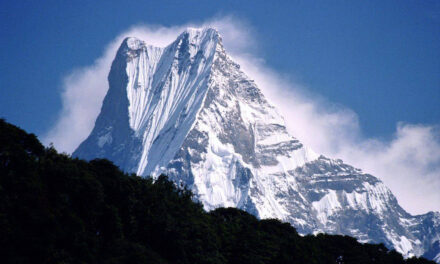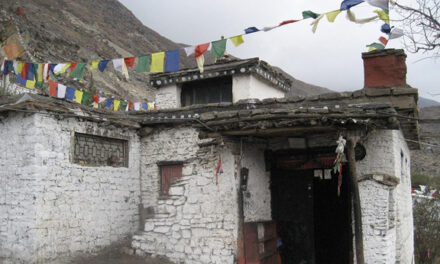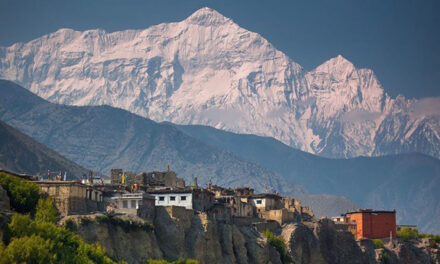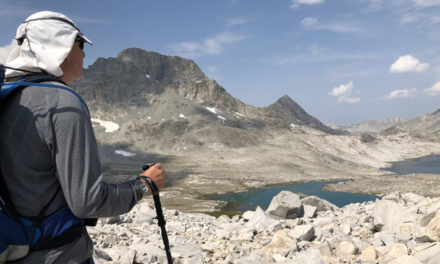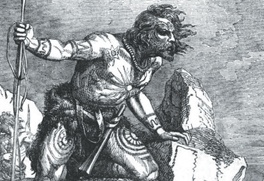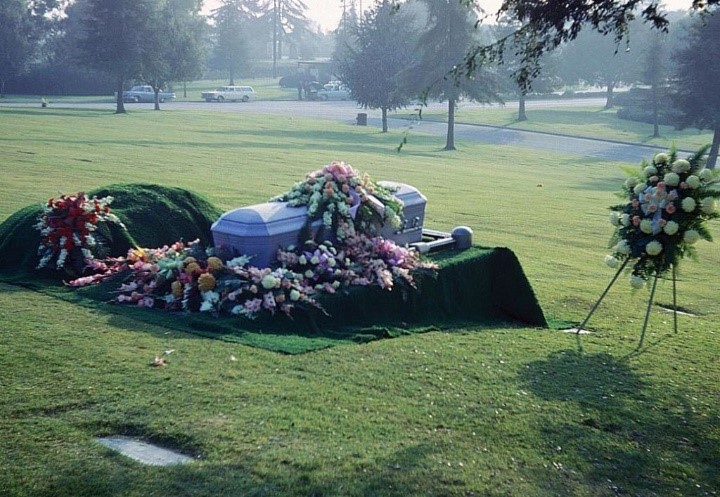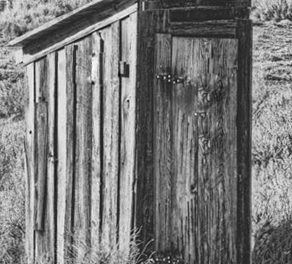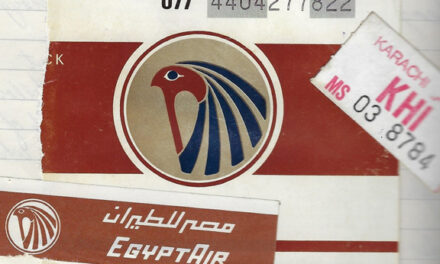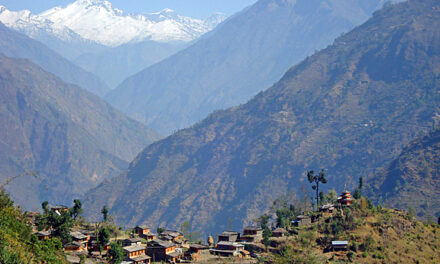We could feel the radiance of the burning pyres nearly a hundred feet away. Woody fuel crackled and popped as a hundred-plus Hindu celebrants sang and danced in undulating patterns around three flame-filled concrete platforms. Not unlike moths circling close around gas camping lanterns, they seemed to be slowly cooking themselves.
The fires were reaching their zeniths. Sparks sporadically shot out like fireworks. Each pyre produced twenty-to-thirty foot fiery spikes, towers that remained virtually frozen in place under a hot afternoon sun. Wavering only occasionally, the orange-y flames periodically vibrated—as if they contained fidgeting spirits. Perhaps they did.
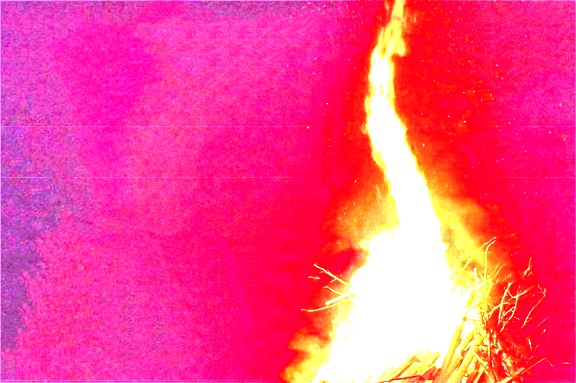
Flowers and incense tossed into the infernos produced smoky, scented wafts that periodically enveloped us under the trees, making us choke. All the while, cows roamed about and scavenged the colorful petals that had dropped to the ground, oblivious to the heat, the noise, and the festivity. They milled about among the celebrants as if they owned the place, and nobody shooed them away. Their flicking tails disturbed nothing but the impetuous flies.
*
Grant, a wandering Kiwi who strangely resembled Frank Zappa, had connected with me on the way to Agra. We shared a seat on a dilapidated train that transported chickens, dogs, mid-sized piglets, and assorted human passengers out from the surroundings of New Delhi—some hanging from its doorways, some sitting in the aisle, and a few jammed into the overhead racks. Like me, Grant preferred the local trenches to the more refined accommodations; resisting the higher-cuisine and the spoon-fed cultural indoctrination of the tourist traders.
We’d each chosen to discover India unassisted, brushing shoulders with the commoners, eating in the bug-infested open-air shops, and sleeping on hammocks. In exploring the subcontinent’s parched surface, the sun had baked us far beyond the sallow complexion of most westerners. We’d morphed, and we’d hardened. I’d shed about ten pounds from eating microbes that my body couldn’t fight. We looked like dark-skinned adult urchins.
Together, we maintained an aggressive schedule of plunges into the Indian countryside. Maps in hand, we chose drivers of taxis and rickshaws who appeared most in need, then tipped them generously. We ate at restaurants devoid of tourists, cautiously peeking into their kitchens to be sure the pots were indeed bubbling over sterilizing flames. We scratched scrawny flea-bitten street dogs behind their itching and neglected ears and weighed the faces and extended hands of the begging children who often followed us.
A particularly lean and independent driver named Ganga was eventually chosen as our exclusive Rickshaw man. We liked his name, and we bought into his heartbreaking story that his six children would starve if he didn’t get some business. He was about our age, mid-twenties. Once engaged, Ganga cycled us everywhere.
*
This day, Ganga had brought us back to the old Red Fort to visit the monkeys. It was our second day at the site. We simply couldn’t get enough of those little simians with human-like fingers, curious eyes, and long tails. We rode in Ganga’s dilapidated black rickshaw with the torn sun cover and limping wheel. The road was so potholed and uneven that he nearly stopped at each large bump to avoid tipping the rickety contraption on its side.
When Ganga pedaled up hills, especially under the midday sun, his scrappy muscles stood out in knots. It was all he could do to move us along. He strained, even more, to hold our collective weight back on the downhills, leaning back against the pedals with all his weight to keep the rickshaw in control. I wondered how many years he’d be suitable for this type of physical strain before he broke down himself.
Grant and I occasionally dismounted and walked, insisting that we needed the exercise. We felt guilty making such a skinny, impoverished man suffer at our expense. Whether he believed we needed the exercise, I wasn’t sure. I know our walking bothered him immensely.
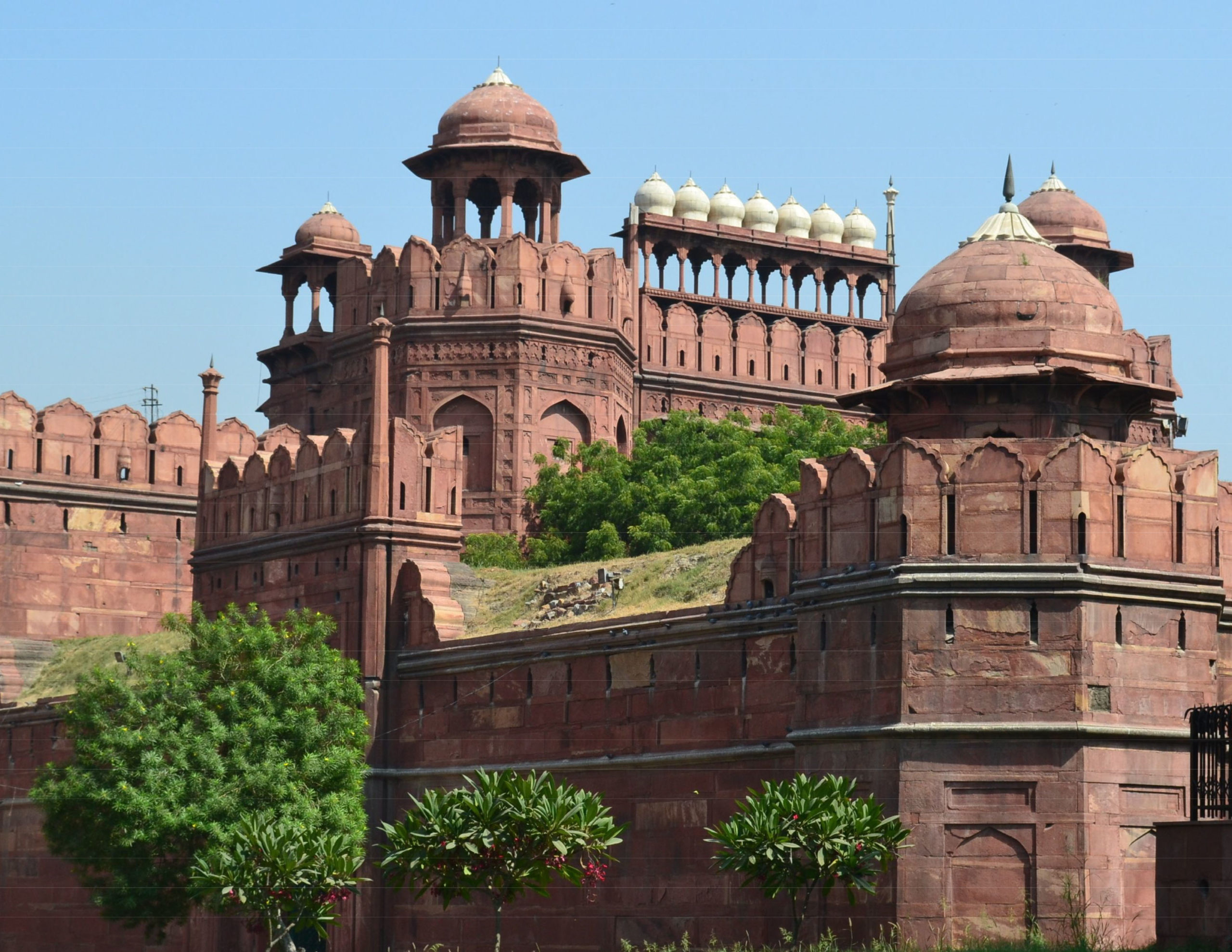
At the Fort, we had to search for the monkeys. We found them high up on one of the parapets, playfully scampering about. While Ganga waited at the rickshaw, we climbed up to them then cautiously played a game challenging their ability to catch peanuts tossed up from our lower positions. Eventually, we moved up and sat with them atop the Fort’s uppermost outer wall, observing their quirky behaviors. There we could view the Yamuna River for miles, upstream and down. It was upon that riverside wall that we heard the drums.
It took some minutes to locate the source of the noise. It came from between the fort and river and wasn’t immediately visible. We sat there just looking, listening, pointing, and speculating; then we saw.
A procession of more than a hundred people was snaking along a riverside path, heading away from us in a line more than a hundred yards long. Single file, they slowly wound through the trees. Dressed in white cloth, they carried all manner of things, most of which were too far away to identify. However, what we could see from our distant perch were bodies—lying face-up upon mats, laid atop horizontal poles over the shoulders of bearers. It was some sort of funeral. As we stared, they disappeared into a thick grove.
Grant and I promptly clamored off the fortress wall, forgetting the monkeys in the process, and dashed out the Fort’s stately old entrance toward our rickshaw.
“Ganga!” we called.
*
We directed Ganga to pedal us into closer visual proximity to the procession. Staying far enough away not to be invasive, we dismounted and seated ourselves on a small hill to observe, under a tree, out of the sun’s heat. The line of walking people had now reached a large clearing near the river a couple of hundred yards away from us, where they were assembling into a milling crowd.

As we watched, we verified that human bodies were being carried along, each wrapped in colorful muslin and adorned with flowers and paint. Walkers who were not bearing the bodies toted bundles of branches and twigs, food, or garlands of flowers. Most of the entourage wore bright colors on their faces and hands.
Drums continued to beat.
In the distant clearing were a collection of concrete pyres near the river’s edge—raised rectangular blocks constructed in the sand at the high watermark. There were five in a neat row, accessed by steps. Upon each appeared a pile of ashes. It was an outdoor crematorium.
The entire procession eventually reached the pyres and coalesced around them. The bodies were then lowered and attended to; each one adorned with bright yellow, red and orange colors, and then with flowers. Then, when the decorating was done, the corpses were moved to their respective pyres, lifted, and placed atop a mound of wooden fuel.
To the drumbeats, the crowd sang and danced around the readied platforms. This continued until three men each lit and raised skyward a burning torch. At the commencement of that first smoke, everyone became momentarily silent. Minutes later, the three pyres were ignited by those same men, and the flames began. Then the fires grew. The mood was joyous. We watched from our hilltop, mesmerized.
These people were not mourning.
*
Grant and I both jumped when an Indian teenager wearing a western shirt appeared out of the trees from somewhere in the back of us and hollered “Hello!” with a distinctly British accent. We were unnerved. Who was this? Were we being indiscrete?
The lad was curious about who we were and what we were doing. We told him that we were tourists, had seen the procession, and that we were merely watching from our distant vantage—so as not to interfere. We asked him what the ceremony was about and if it was okay to be there.
The teen seemed disinterested in our curiosities and answered only a few of our many questions. He was clearly engaged in more important activities. He carried with him a small and grungy tea set in a plastic bucket.
After satisfying himself that we meant neither harm nor disruption to the ceremony, he asked if we would like to join him with his “friends,” indicating the direction of the crowd we were watching. Not knowing what was intended by his invitation, we asked if that would be appropriate. “Of course,” he responded with the typical Indian twisting side-nod of the head. He then insisted we follow him.
Ganga, who wasn’t invited, refused to tag along with us. He said he would not leave his rickshaw unattended. We tried to interest him, but he waved us on. Perhaps he felt his presence wasn’t welcomed, as the ceremony concerned friends and families of those he didn’t know. He did, however, agree to wait for us.
As Ganga grumbling-ly returned to the rickshaw, we followed the teen down toward the lively gathering. The three burning pyres were gaining intensity, pouring inky smoke into a lazy cloud that drifted over the Yamuna. We could hear the fires popping as we approached.
*
Our new guide led us down to the crowd and then around their fringes. On one platform, not in use, were bone fragments among the ashes. A dog slept upon those same ashes, under the shade of an overhanging branch, sprawled across a charred human femur. A cow wandered through the crowd, swishing flies with its tail. It found a flower garland that dropped from one of the bodies and snatched it up hungrily.
Our guide eventually led us to a thicket of trees on a slight rise about a hundred feet above the ceremony. There, in the shade, in a circle of dust around a small smoky fire, sat four filthy Sadhus. They stared at us.
“Ugh,” I thought. Sadhus. It hadn’t been that long since my disconcerting experience in the marketplace.
These men wore the typical loincloths and not much else. They looked up at us defensively as we approached. Our young guide uttered something in Hindi that calmed them—maybe telling them we wouldn’t bite. Or perhaps he told them we’d make a pleasing sacrifice. I felt blind.
The Sadhus looked primeval, with skinny bodies and scraggly long hair. Their eyes were black within black, set upon grimy faces decorated with orange and yellow paint. Their gazes were piercing, seeming to laser into us. I felt spiritually exposed. At first, it wasn’t apparent, but they were chanting in a low collective voice. Grant and I smiled at them cautiously but attempted no verbal communication. Words would have been futile, maybe patronizing.
We remained silent, standing away from the men.
Our guide methodically removed the dirty tea set from his plastic bucket, put tea in the pot, and poured in hot water from a filthy can smoking on the edge of the fire. The teapot was then set aside to let steep in the dirt. We were beckoned over to sit, so did, cross-legged in the dust amid the ants and flies. When the tea was eventually dispensed into grimy little cups, brown sugar cubes were added. The liquid concoctions were stirred with a rusty communal spoon. Our guide and tea provider then passed the filled cups to the holy men.
He then explained to us that the Sadhus were there to oversee the funeral ceremony. It was one of those things they did. He described some vague responsibility concerning the ceremonial platforms, but I didn’t understand it. Notwithstanding all the surrounding commotion, the Sadhus appeared wholly unconcerned with the ceremony – they were more engrossed with the preparation and consumption of their tea.
Cups in hand, they pressed leathery lips to their respective cups and drank. We watched, horrified at the apparent lack of cleanliness or sanitation. Then the older Sadhu directed the cups to be refilled and passed over to us.
Grant and I exchanged furtive, concerned glances. We hadn’t been taking that many safeguards concerning food hygiene, and both of us were already infested with microbes from the local cuisine. So it seemed as if the issue of health was irrelevant. Not wanting to insult our hosts, we took the cups.
Grant ventured the first sip and exclaimed, “Good!” nodding approvingly. I scrutinized my cup, eying the filthy brew that swam with a multitude of particles. I wondered if the water had actually boiled at the edge of the fire. Then I took a sip.
*
The Sadhus alternated between chanting and gazing at us. They paid little attention to the ceremony and periodically turned to one another to murmur. I felt an intense presence. We had no idea what they were saying to each other and didn’t know their thoughts. None spoke to us in English and our distracted guide didn’t enlighten us.
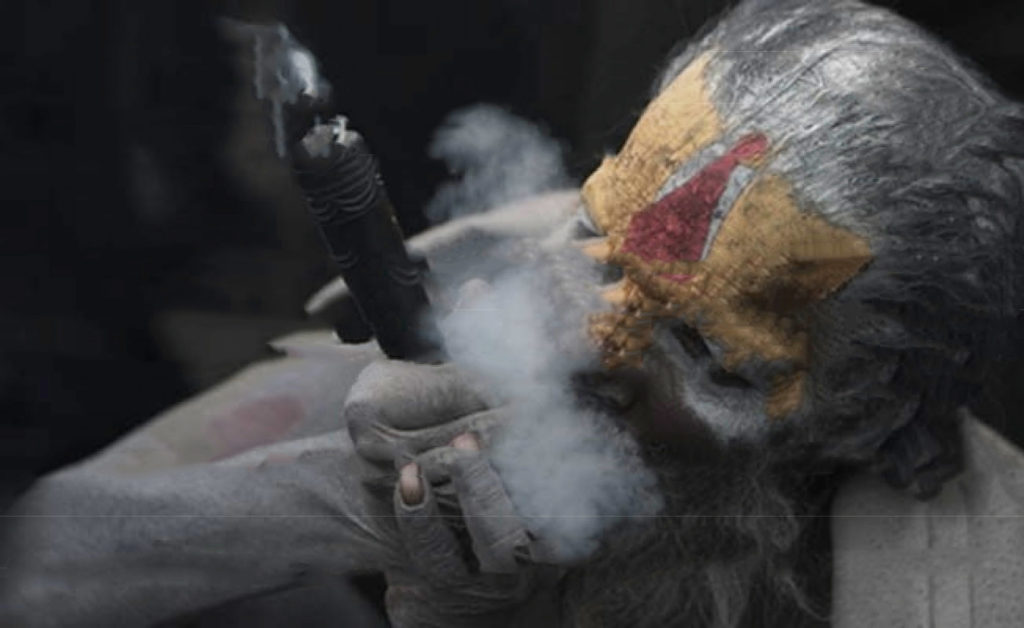
While this went on, one of the Sadhus pulled out a ceremonial chillum from a satchel tied to his loincloth. The carved marble pipe was dirtier than the teacups, and he looked into it then tapped it out on a rock. It was carefully reloaded with ceremonial ganja, undoubtedly dispensed as a medicinal, religious supply from the “Agra Government Shop,” which sells psychotropic herbs to the locals. He then lit it with a burning twig from the cooking fire, held it up, and took a deep lung-stabbing hit. He coughed, then passed it our way.
Grant looked at me with the expression of either “Oh shit!” or “Oh well.” We obliged them and soon sank into an ethereal twilight. Strange was becoming stranger.
The teacups were refilled and re-circulated among the group. The chillum was reloaded and passed around several more times. This cycle repeated itself for more than an hour, and I became increasingly suspicious that we might be heading for some unexpected, holy confrontation or, god forbid, a replay of my delirious Moroccan mugging experience from several months before. But that didn’t happen.
Grant and I merely acclimated. Somehow we shifted toward the mind-altered serenity of the holy Sadhus. We became one with a very long moment.
*
As the pyres burned down, I became sore and stood up to stretch. I looked down at the ongoing ceremony and saw a charred arm roll out of one of the fires. A hungry cow nearly stepped on it during its search for flowers. One of the celebrants eventually spotted the limb and, using sticks as tongs, nimbly pitched it back into the coals.
I sat back down.
The afternoon wore on and, as the fires gave way, the festival gained strength. The singing intensified. The heat of the day held an oppressive grip on everything, even in the shade.
Flies buzzed in our eyes and alit on our faces. The Sadhus ignored them, even when the insects crawled across their faces to drink the tears from the corners of their eyes. They behaved like seated statues, exhibiting a stoic type of resolve.
Seemingly, hours passed.
After a long period of cross-leggedness in the dirt, an older Sadhu suddenly erupted with loud yells that seemed like incantations. I sat back, startled and wholly ignorant of his ranting message. He then stood up and pointed an accusing finger in our direction, continuing to tirade in Hindi. These seemed like expressions of rage but might also have been holy hexes. I was horrified that we’d done something insulting, something untoward. His action immediately elicited agitated responses from the others.
Grant and I readied ourselves for a quick exit; hands planted in the dirt, prepared to jump up and flee. Our young teenage guide had wandered off and was nowhere to be seen. We maintained our readied posture and remained silent, feeling alone and vulnerable. I tried to affix a pleasant expression across my face, forcibly. Composure was key.
Then the Sadhu who exhibited the tirade mysteriously sat back down and poured out more tea. I wondered if the ranting assault was some kind of a test—and if we had passed. Another Sadhu removed some unrecognizable food morsels from a pouch on his waist and popped them in his mouth. His pouch was passed around among the others and each holy man ate from it. Grant and I declined when it came to us—ever so politely.
The pyres burned lower.
Our teenage guide was still gone.
Thirty minutes later, another Sadhu abruptly yelled something directly at me. I cringed in surprise. Was I not paying appropriate attention to him? The crematorial scene was engrossing, and I may have drifted off staring at the fires. I still wasn’t quite sure what we were doing with the Sadhus, anyway—outside of being invited and then having to share their tea and ganja. Maybe I’d dozed off and snored a little.
In a recoiled state, I maintained my seat in the squalor. There was no reason to rattle them by reacting suddenly to the assault. Yet the face of the second ranter seemed strained with agitation as if he were about to snap. I looked around for our guide, but he was still not to be seen. With nothing to say, nothing that could be understood, I mentally steadied myself and focused upon exuding an inexpressive expression: time to be steeled.
While the stressful moment languished, a loud explosive pop came from behind me, like a cherry bomb or a shotgun. It came from the gathering. Grant and I ducked, rolled, and leaped to our feet. Where was the shooter? The moment seemed ripe for an exit, if necessary.
While we tried to gather our wits, our young guide came strolling up from the pyres with a beaming smile.
“Thought we lost you,” said Grant.
Our guide beckoned us to come down to the pyres. Hallelujah! I thought, glad to be departing the grumpy old men.
“Come see,” he said with another one of the Indian twists-nods. “Souls are ascending.”
“What?” we responded in unison.
“Souls,” he repeated.
“Oh, the souls. But what’s with the shooting?” I asked.
“Shooting?” he responded.
“I heard a shot,” I explained.
His face smiled back.
“No shot,” he said. “Soul ascending.” He added another one of those nods.
I began to re-inquire, but there was another sharp report. This time I saw the source. It came from one of the pyres. Specifically, it came from one of the corpses.
Our guide smiled again.
“Soul ascending!”
“Was that…?” I started to ask.
“The skull, Steve!” cut in Grant. “I believe it just exploded. Soul ascending means skull exploding.”
I bit my tongue—hard. That vision, this reality, Grant’s deadpan answer, caught me off guard. The Chillum’s effects had challenged me to contain my emotions: to stifle some eruptive response, horror or humor, or an immediate flight from the scene.
“Yes,” replied our guide. “Yes, yes.”
“Soul ascending,” he added once more.
A skull, or part of it, was visible through the shimmering heat of the middle pyre. So were other bones. It all shimmered orange like the wood embers and, like wood, cracked and fell apart when the fires shifted.
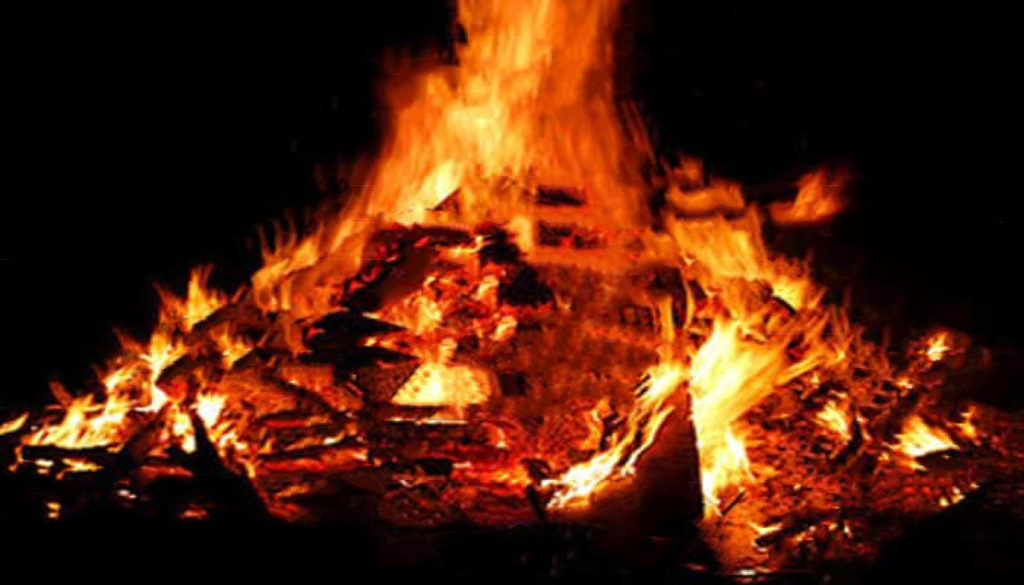
“Ooh-kay,” finally I responded.
Our guide was happy. One might have thought he’d just been delivered a pile of rupees, but he wasn’t delighted in anything so material. It was spiritual glee—in witnessing the brain-bursting release of the spirits of the dead. That was my interpretation.
The crowd waited for the last ascension. It came several minutes later with another explosive report. Then the Hindus began to sing and chant with renewed vigor. Some were clapping and spinning. The mood seemed to be taking on a new unbridled and unpredictable demeanor. Many were clearly under the influence of more than just spiritual jubilation.
A glance in Grant’s direction confirmed that the coming darkness was our calling to depart. We didn’t have to verbalize.
We made our way back to the Sadhus sitting around their smoldering fire and thanked them in our most respectful way: a bow and a “Namaste.” Did they understand us? They seemed to take no notice of us; or anything else.
We thanked our guide and, with a slight bow, he thanked us back for coming, his hands pressed together.
We then walked away, waving a cheery goodbye, delighted that we’d been freely released from all those whirling, mystical humans, glad that they hadn’t seen fit to burn a couple of intrusive tourists on the extra pyres. Fortunately, we hadn’t overtly insulted anybody. As for the Sadhus’ outbursts, who knew? We might have confronted an impossible challenge if we’d needed to make formal apologies.
*
We wandered back along the river trail, into the shadows, then up the hill to find Ganga sleeping in the rickshaw. It was dusk and when he awoke, he was nervous. Ganga didn’t want to be on the road at night. Moreover, he didn’t want to talk about the event we had just witnessed. He seemed agitated. It was too late, and he appeared spooked that we hadn’t come back from the ceremony sooner.
“We must go,” Ganga implored.
We climbed aboard and he pedaled us away into the near-darkness.

